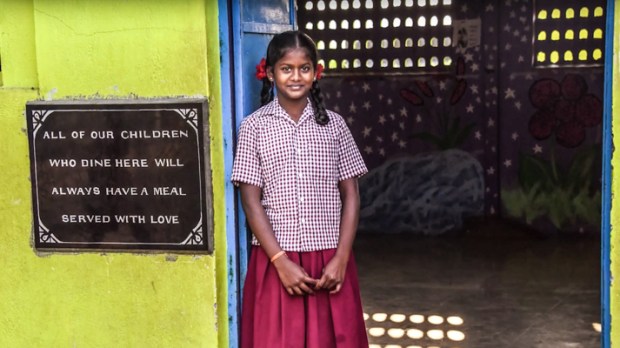Whatever image comes to mind when the word “orphan” is mentioned, whether it’s Dickens’ Oliver Twist or Little Orphan Annie, orphanages have been changing, and may soon become a thing of the past.
There’s a growing realization that many “orphans” today actually have at least one living parent, and that going back home, if possible, would be far more beneficial than staying in an institution.
Experts in the field envision a day when orphanages take only the children who really need to be there, and the institutions are transformed into community centers where families can turn for the support they need in keeping their children at home.
After the devastating earthquake in Haiti in 2010, the number of children in orphanages increased “exponentially” because of family separation, said Shannon Senefeld of Catholic Relief Services. But CRS, the overseas aid and development agency of the Catholic Church in the United States, was able to reunite many children with their parents through “family tracing.”
“So we started thinking this might be possible in other places as well,” said Senefeld, CRS’s vice president of program impact and quality assurance. “We found that there were still a lot of parents visiting kids in orphanages … or kids would actually go back to their homes for a visit. We started thinking, ‘Why are they in orphanages if they’re not actually orphans, like we would traditionally think of an orphan being?’
“So we did this research in Zambia and found that a lot of kids were living in orphanages because of poverty,” Senefeld said in an interview. “Their families thought they could have access to an education or healthcare if they were placed in an orphanage. So these became de facto alternatives to parents who didn’t have resources available in their homes. Many felt it would be a temporary solution until they were able to get the resources together. But they were almost never able to gather the resources they needed. So the kids became more and more alienated from their homes, their families and their communities.”
CRS developed a plan that is now one of eight finalists for a MacArthur Foundation $100 million grant. In September, five finalists will be announced.
Separately, after visiting India in 2000 and seeing some pretty bad conditions in orphanages, Caroline Boudreaux gave up a very successful business career to found the Miracle Foundation. The foundation, based in Austin, Texas, helps transform orphanages in developing countries and helps get children back home.
“So many people think that if they put their children in an institution they’ll be fed and educated, but so many times [the orphanages] don’t have enough people to care for them and love them, so they’re missing one of the most basic components of being a human being, which is that belongingness or attachment,” Boudreaux said in an interview.
For orphans who have nowhere else to go, the Miracle Foundation helps ensure that orphanages are in line with international standards. The foundation has developed guidelines based on 12 of the 141 “rights of the child” in the United Nations Convention on the Rights of the Child.
“One of them is the right to live with your parents or relatives if possible,” Boudreaux said. We take an assessment of all the children (in a particular orphanage) and we find out: Do they have two parents? Can they go home? Do they have a single mom and she just needs us to pay for their school so the kids can go live at home?”
The foundation also does a health assessment and tracks things like height and weight and the amount of iron in their blood. They keep track of vaccinations and watch for anemia.
“We partner them with a local doctor or nutritionist, and they come up with a new menu, and we start feeding the children with a better menu,” Boudreaux explained, “including fresh fruits and vegetables. You literally watch their height and weight go up on the growth chart.”
The Miracle Foundation has found that the average caretaker-to-child ratio in orphanages in developing countries is 80-1. It is working to get that down to 20-1. It’s also important to support orphanage staff, especially caretakers, Boudreaux said.
“How long has that caretaker been there? What is the education level of that caretaker? Is that caretaker paid in check or cash? Do they have a way to save money, and do they have a bank account?” are some of the questions the foundation examines.
“We train the caregivers every single month, in child development and how to discipline children,” she said, adding that the foundation treats the orphanage “like a company” in order to foster more professionalism. “It’s like a franchise. They all have the same business model,” she stated. “We help them find an accountant; we get them computer software. Everyone has the same program. How do you keep track of 160 kids’ booster shots? We teach them how to fundraise.”
Another aspect is to guide orphanage staff on how to get children back home and how to respond to requests for admission so each institution is not overwhelmed. “So when the next family walks into the orphanage and says ‘Take my baby, I’m too poor,’ the sweet nun won’t say, ‘Oh sure, I’ll do it.’ We need to give her the language and policies to keep children out of institutions.”
Right now, the foundation is working with orphanages in India, Uganda, Kenya, Sierra Leone, and Ethiopia, but hopes to begin working with orphanages in Nicaragua and Guatemala in October. “Right now, we work with 50 orphanages and expect to be at 75 by the end of the year,” Boudreaux said.
“Thank God people are calling for the deinstitutionalization of children, because the orphanage system is failing children,” she said. “Thank God someone is out there saying, ‘What are we doing? Why are we warehousing children?'”

